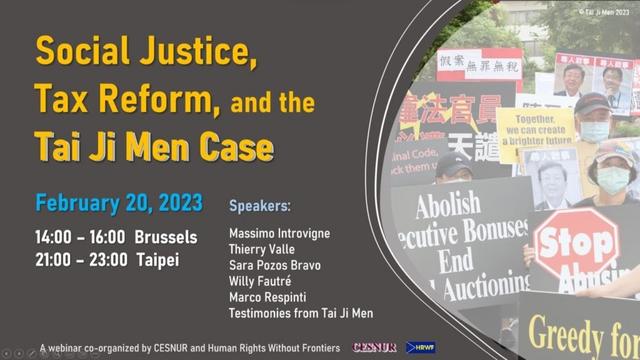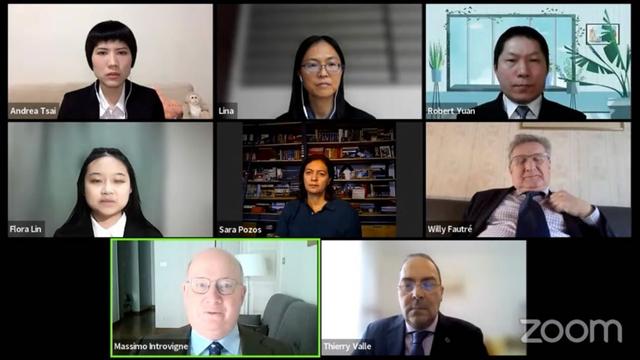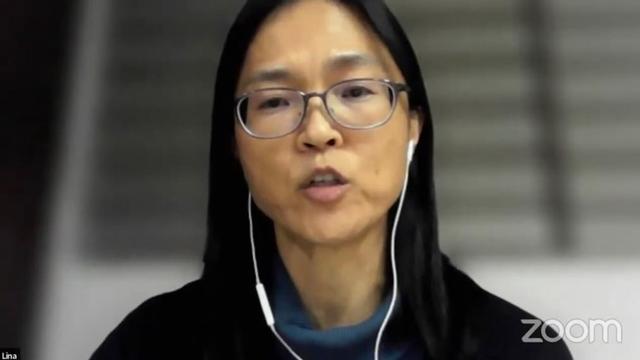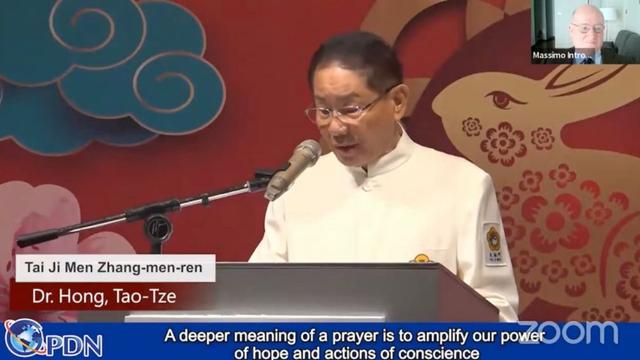Scholars and human rights activists discussed tax reform and the injustice vested on Tai Ji Men on World Day of Social Justice
by Alessandro Amicarelli

On February 20, 2022, United Nations’ World Day of Social Justice, CESNUR, the Center for Studies on New Religions, and the Brussels-based NGO Human Rights Without Frontiers co-organized one of their bi-monthly webinars on the Tai Ji Men case, with the title “Social Justice, Tax Reform, and the Tai Ji Men Case.”
The Italian sociologist Massimo Introvigne, who serves both as managing director of CESNUR and editor-in-chief of Bitter Winter, introduced the webinar by presenting the story of the Great Bengal Famine, which in 1770 according to different estimates killed from one to ten million Indians in Bengal, present-day Bangladesh, and Bihar. Introvigne explained that, while there were also natural causes at work, including a drought and a smallpox epidemic, the tragedy was mostly due to a sudden raise of taxes by the British East India Company, a private corporation that had started ruling the area in 1764. Several historians, he added, regard the Great Bengal Famine as a genocide, perhaps the only genocide in history created by taxes.
While today tax injustice does not cause genocides, Introvigne said, it still generates considerable unnecessary suffering and violations of human rights, as the Tai Ji Men case demonstrates. The World Day of Social Justice, he concluded, should be an opportunity to affirm that there can be no real social justice without tax justice, including for Tai Ji Men.
Introvigne presented a video on Tai Ji Men’s Lunar New Year celebrations in Taiwan, presided over by their Shifu (Grand Master), Dr. Hong Tao-Tze, and attended by representatives of the government and the academia, and foreign diplomats. He then introduced the first two speakers: Thierry Valle, the director of the ECOSOC-accredited NGO Coordination des associations et des particuliers pour la liberté de conscience (CAP-LC), and Sara Susana Pozos Bravo, professor at the Universidad Sämann de Jalisco in Guadalajara, Mexico, and a well-known columnist in her country.

Valle reported on his organization’s recent filing of a written statement for the 52nd session of the United Nations Human Rights Council in support of the designation of December 19, the day the Tai Ji Men case started in 1996, as the “International Day Against Judicial and Tax Persecution by State Power.” The new International Day has been proposed by Tai Ji Men and by the NGO Association of World Citizens, which is also ECOSOC-accredited. Valle noted that tax persecution, in particular, is used as a tool to violate human rights and freedom of religion or belief. Some minority spiritual groups are slandered as “cults” and persecuted through various means, including taxes. CAP-LC, Valle said, has submitted several documents about the Tai Ji Men case to the UN Human Rights Council, and now is calling for other NGOs and UN member states to support the “Declaration of the International Day Against Judicial and Tax Persecution by State Power.”
Sara Susana Pozos Bravo emphasized that social justice is a fruit of democracy, and reflected on how Taiwan tried to overcome the totalitarian system of the Martial Law period that ended in 1987, build a democratic regime, and implement transitional justice. However, Pozos Bravo said, there is “something” in Taiwan that indicates that this process has not been totally successful. This “something” is the Tai Ji Men case. While the Martial Law was characterized by the notorious “White Terror,” Pozos Bravo said, a “terror of persecution” continued after 1987, as evidenced by the politically motivated persecution of 1996, which also hit Tai Ji Men.
But why, Pozos Bravo asked, did the Tai Ji Men case last longer than any other originating from the 1996 crackdown? Her tentative answer was that Tai Ji Men and Dr. Hong called Taiwanese society to repudiate corruption and live democracy with justice and respect—which disturbed some corrupt bureaucrats. Pozos Bravo concluded by joining other speakers in offering her support for designating December 19 as the “International Day Against Judicial and Tax Persecution by State Power.”

Willy Fautré, co-founder and director of Human Rights Without Frontiers, opened the second session by presenting a video, “Children of Heaven.” The beautiful video opened and concluded with a song from the indigenous Atayal (also called Taiya) tribe in Taiwan. Young boys and girls presented an ancient fairy tale about overcoming the “five poisons” of greed, hate, ignorance, arrogance, and doubt by going back to our conscience.
Fautré reminded the audience that February 20 was designated by the United Nations as World Day of Social Justice in 2009, and emphasized the strict connection between social justice and human rights, including freedom of religion or belief. By quoting the book “Who Stole Their Youth,” Fautré characterized the Tai Ji Men case as one in which social justice was consistently violated for years. Bureaucrats, he said, put their personal interests and opinions before fairness and justice, as the Control Yuan later recognized, with tragic consequences. However, another violation of social justice occurred when those who had clearly violated the law in persecuting Tai Ji Men, including Prosecutor Hou Kuan-Jen, were not sanctioned, Fautré said.
Fautré then introduced five dizi (disciples) of Tai Ji Men who offered their testimonies. Flora Lin, a university student majoring in Food Safety, reported how she grew up in a family of dizi, and Tai Ji Men helped her overcoming her natural shyness and improving her communication skills. She also participated in several protests about the Tai Ji Men case, and had the opportunity to study and understand the problems of tax justice and the need for tax reform in Taiwan. She expressed the hope that the World Day of Social Justice would be an opportunity to persuade the Taiwanese government to start a process allowing a public welfare organization that did so much for world peace and human rights to operate freely, and devote its energies to conscience education rather than to protest.
The full video of the webinar.
Robert Yuan, a public servant, shared his 30-year experience as a Tai Ji Men dizi who derived great benefits from the Qigong practice in both his family and professional life. He also recalled the tragic days of the 1996 crackdown and its aftermath, when media slander led to discrimination and family quarrels. He mentioned the case of an old female dizi who was vilified and left in a park to walk by herself by a taxi driver who had been persuaded by the media campaign that Tai Ji Men was an evil organization. Today, Yuan said, courts of law and international scholars have conclusively established that accusations against Tai Ji Men were false. However, the tax persecution continues, and the case is in an urgent need of a solution, he concluded.

Lina Liu, a fund manager in an investment trust company, compared her own professional experience with the actions of the National Taxation Bureau in the Tai Ji Men case and in other controversial incidents. Investment trust companies officers have very strict rules they should comply with, including a system of safeguards against employees using company’s information for their own personal benefit. Even their cell phones are under centralized supervision during trading hours at Taiwan Stock Exchange. Strangely, she said, the rules of the National Taxation Bureau appear to be less strict, with the result that corruption incidents are frequent. Liu added that in the case of investment trust companies, managers who act illegally or make serious mistakes are punished and should indemnify the company’s clients. Nothing similar happened after courts of law and the Control Yuan had ascertained that Tai Ji Men Shifu and dizi were innocent of all charges and those who had persecuted them had breached the law. Clearly, this situation should be corrected, Liu concluded.

Dorian Tseng, a university student majoring in music, reported that she participated in Tai Ji Men performances in the United States and India. Tai Ji Men, she said, truly applies the principle that music is an universal language that transcends differences of culture and religion and may touch the hearts of many. Tseng explained that she was reluctant to mention the Tai Ji Men tax case to those who only encountered the movement through its peace activities and performances. However, as her activities in the Tax and Legal Reform League grew, Tseng said that she realized it was important to make international friends of Tai Ji Men aware of the enormous injustice vested on them in Taiwan.
Andrea Tsai, a sales representative, told the story of her mother, who bravely resisted the slander campaign against Tai Ji Men that started in 1996. She always told her that Tai Ji Men was the best and safer place where she could grew up and learn about justice, peace, and conscience. Later, Tsai participated in international Tai Ji Men events, including in November 22 the 23rd International Conference of Global Chief Justices in Lucknow, India. She was moved, she reported, when she saw international leaders, including the President of Mauritius, Prithvirajsing Roopun, ring the Tai Ji Men Bell of World Peace and Love and express their wishes for peace. She concluded that peace can only come when social justice is affirmed, which includes tax justice, freedom of religion or belief, and a solution of the Tai Ji Men case in Taiwan.
The dizi’s testimonies were followed by a musical video chronicle of Tai Ji Men’s activities in Taiwan and internationally that promote love, peace, and justice through performances and global events, as well as protests about their case.

Marco Respinti, an Italian journalist and scholar who serves as director-in-charge of Bitter Winter, offered the conclusions of the webinar. He stated that defining social justice is comparatively easy but achieving it has proved very difficult. All governments claim that their aim is social justice, including those most blatantly denying it in practice. Ideologies, Respinti said, distort the idea of social justice and become “ideocracies,” according to the expression of German-American political philosopher Eric Voegelin. The international definition of social justice owed much, Respinti said quoting Argentinian-American economist Alejandro Chafuen, to two Italian 19th-century Catholic priests, who disagreed between themselves on several other subjects, Luigi Taparelli d’Azeglio and Antonio Rosmini Serbati. They noted that social justice is a philosophical and spiritual concept before being a legal one, and is about giving everybody their due, not implementing state-controlled programs of redistribution that often lead to oppression and injustice.
Tai Ji Men, Respinti said, teach the core element of true social justice, conscience. Its Shifu and dizi are also victims of one of the most blatant cases of social injustice, Respinti concluded, by quoting the “Catechism of the Catholic Church” on social justice as an element that is essential to achieve the common good by giving to all organizations and individuals their due “according to their nature and their vocation.”
Source: Bitter Winter

